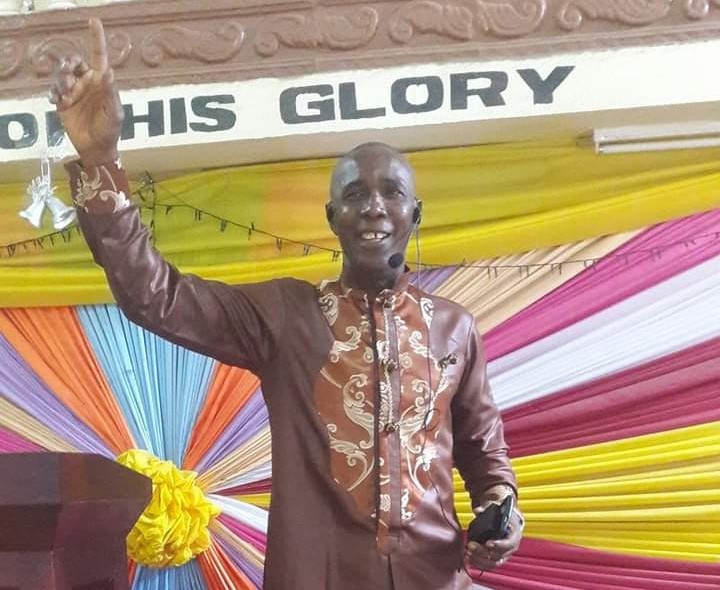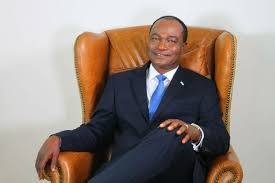The Right Direction: Sierra Leone treading the path to prosperity via an accountable and a transparent government
Late last year, I was opportune to attend a one day confab organized by the Centre for International Migration and Development (CIM) in Frankfurt, Germany. CIM, Germany´s human resources placement organization for development cooperation, through that event was able to bring together African experts from various organizations engaged in international development and good governance programs in their respective countries. The program was aimed at using migrants as “bridge builders” and key players in development initiatives in their home countries that is supported by Germany´s agency for international development – GIZ formerly GTZ. (Photo: Umaru S Jah, author)
At the conference were several speakers, mostly African expatriates, who spoke about a wide range of issues that had to do with the continent´s stride to achieving the Millennium Development Goals (MDGs) and the contribution they could make to attain such goals. However, of all the eloquent speakers, it was one that captured my attention. He was Rahime Diallo, Project Officer of the African Diaspora Policy Centre. Diallo was speaking about a project run by his centre which aimed at improving the skills of “diaspora-oriented” policymakers in terms of designing what he called “effective policy instruments” to facilitate the integration of diaspora-driven development into the overall national agenda in their respective countries. He went on to stress the need for transparency and accountability to form the bedrock of such development initiatives because according to him, one major obstacle to effective policy implementation in the governance of our continent has been the lack of the twin principles.
His brilliant exposé strengthened my conviction that the major problem most African societies are facing is not the lack of effective good governance policies or policy analysts but rather the lack of effective leadership to ensure that such policies are implemented in transparent and open manner.
While it is generally accepted that there is need for state leadership to account and explain to their citizens about the use and management of public wealth and the establishment of a framework of how citizens could demand and enforce accountability from those in power, in most countries in Africa, not much progress has been done in that direction. I have to restate that this is not because of a lack of policy and institutional frameworks but rather because of the lack of informed leadership and the political will. But as MO Ibrahim, founder of the Ibrahim Index of African Governance (IIAG) put it, “Systems of accountability are necessary if African countries are to avoid the problems that have plagued the region as a result of the uneven distribution of wealth and the denial of opportunity to citizens.”
This very broad and blurred picture mirroring the state of “Accountability and Transparency” from a continental standpoint brings me to the exceptional situation in my home country Sierra Leone – the main theme of this piece.
Under the leadership of President Ernest Bai Koroma, Sierra Leone is certainly defying what seems “normal” in several developing societies by moving instead towards a path guided by accountability and open government. Sheka Bangura, author of the book “Rethinking Accountability in Africa – A Practioners´ Perspective”, acknowledged that with respect to enforcing public accountability in public service systems, his native land of Sierra Leone has in recent years made enormous progress. While there are several indicators pointing to this fact (from the President taking the lead in declaring his assets to strengthening the mandate of the Anti-Corruption Commission to prosecute public officials), I will in this piece focus on two recent developments: the high score attained in the just-released results of the Citizens´ Report Card under the Open Government Initiative (OGI) and the remarkable progress made in the Ibrahim Index of African Governance (IIAG) also released over a week ago. Let me start with the OGI:
The OGI
Regardless of the amount of good governance policies or initiatives that are amassed, without the effective implementation of such policies, a country cannot make any meaningful progress. In fact in most developing societies, the policy frameworks to ensure open and transparent governments have not been lacking. The major problem has been putting these sometimes beautifully phrased and well written concepts into action – the gap between “policy formulation” and “policy implementation” remains a huge one. This is partly because of the lack of a committed leadership to transform such initiatives from words to action. In Sierra Leone, we are experiencing a different and more promising trend. In Ernest Bai Koroma, the country has a leader who is striving to bridge the gap between “policy formulation” and “policy implementation” a menace which like several other developing societies had stifled Sierra Leone´s growth in the past.
To ensure participatory governance, a year after the President took over the realms of power; the OGI was established with a presidential commitment to ensuring accountability in public life. Through its Citizen Report Cards (CRCs) scheme, the OGI “solicits user feedback on the performance of public services especially on the thematic ministries of the President’s Agenda for Change interventions.”
The CRCs is used as an instrument to assess the efficiency of delivery of goods and services across the nation, making it a “bottom-up” approach to governance that will help the administration not only involve the people in its affairs but also enable it to identify problems of service delivery directly from those it is supposed to reach – the ordinary citizens.
President Koroma being an action-oriented leader, the OGI was never going to be another piece of document that will remain in the shelves of State House only to be covered by dust. The initiative was put into action a year after he took office.
The OGI through its CRC program has just released its latest report on the performance of government in key areas including agriculture, health, education, infrastructure, etc. Sierra Leoneans from varying walks of life, including Paramount Chiefs, council representatives, women groups, National Youth Commission, disability organizations and other members of society took part in the survey in which 8050 questionnaires were administered nationwide targeting 50 respondents in each of the 149 Chiefdoms. The report gave an excellent assessment to the government´s policies and implementation. However, for me, this is not the most important because I have always said that if a leader is committed and determined to change the lives of his people, the results are always going to be positive although there maybe challenges, which are in any case part of life. There is however a much more bigger picture which should be stressed here and rightly so in capital letters: FOR ORDINARY SIERRA LEONEANS TO BE GIVEN THE OPPORTUNITY TO ACTUALLY PARTICIPATE DIRECTLY IN THE GOVERNANCE OF THEIR COUNTRY BY ANYLYSING GOVERNMENT`S PROGRAMS AND GIVE DIRECT FEEDBACK ON THEM IS NOT ONLY EXEMPLARY BUT HISTORIC. Show me a better version of participatory governance and democracy! In the OGI program, President Koroma has without doubt introduced a unique system of governance in Sierra Leone which deserves commendation regardless of which political line we choose to follow.
Also of significance is the pace at which these transformations are taking foothold. Imagine where we were during the NPRC, AFRC madness? Or during the years the SLPP rule? I just can’t wait to see what the next five years under President Koroma will look like!
We are just not done yet – lets move on to a regional accolade of the President´s achievements: The just released IIAG!
IIAG Index
It is more likely that people tend to be skeptical about local initiatives and successes than one that has an international dimension. Detractors are often too quick to question the reliability and impartiality of local initiatives. However, in Sierra Leone, the fact that both local and international initiatives are giving plus to the Ernest Koroma administration makes the work of detractors a rather difficult one. Just about the same time as the Citizens´ Report Card gave an A grade to the administration, a renowned regional body, the MO Ibrahim Foundation, in its African Index for Good Governance (IIAG) also gave a positive rating to the progress the country is making under President Koroma.
The importance of the IIAG should not be under-estimated – like the Open Government Initiative, it has, in recent years, increasingly become a tool for policy-makers, keen to assess the impact of their work and see where budgets should be spent, as well as a resource for civil society. The wealth of data allows governments, citizens and civil society organizations to assess the impact of policy interventions, guide resource allocation and learn from the successes and failures of other countries in the region.
In its latest report, launched about two weeks ago, Sierra Leone made meaningful progress in the various categories including: Safety & Rule of Law, Participation & Human Rights, Sustainable Economic Opportunity and Human Development. Now, a brief look at the data over the last five years:
In 2007, when President Koroma took over, the country made a 5.3% progress to achieve a score of 44.5%. It maintained the score for the following year. In 2009, the country made a 0.3% progress followed by a 4.0% in 2010. The latest data for 2011 showed the country achieving 48.1% score, an impressive progress when compared to the pre-Ernest Koroma period when the country was rated as low as 31.6%. At category level, Sierra Leone registered significant improvements in Safety & Rule of Law and Sustainable Economic Opportunity.
Action, not words!
New direction? What evidence of a new direction do we need to see again? The one that will lead us again to the path of violence and destruction? Or the one that has, in just five years, transformed the manner in which government not only provide for but also relate with those it is providing for by actively involving them in governance and service provision? What more evidence do we need again to prove that Sierra Leone has not only taken a new path but is also heading towards a progressive direction?
Action, not words: President Koroma´s records speak for themselves. Just take again a careful look at the latest Citizens´ Report Card and the country´s performance on MO Ibrahim´s African Governance Index to fully grab the point I am making!
The path might be long and rocky and we are not there yet! But with Ernest Koroma at the helm, Sierra Leone is moving towards the right direction and is doing so in a transparent and accountable manner!
Stay with Sierra Express Media, for your trusted place in news!
© 2012, https:. All rights reserved.





